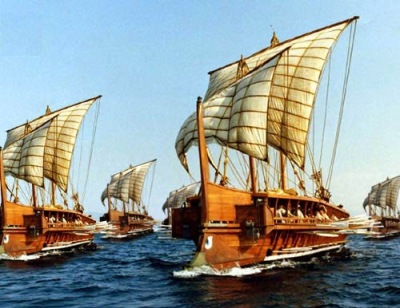Peloponnesian War era triremes.
Largest naval battle pitting one Greek fleet against another. It occurred during the Peloponnesian War. In the spring of 406 b.c. the Athenian general Conon was trapped in the harbor of Mytilene on Lesbos by the Spartan nauarch (admiral) Callicratidas but managed to get word of his predicament to Athens. In 30 days the Athenians readied a fleet of 110 ships, financed in part by melting down gold statues from the Acropolis; to man the oars they recruited everyone of military age, from cavalrymen to slaves. Combined with allied ships at Samos, the fleet numbered more than 150 triremes.
Callicratidas left 50 triremes at Mytilene to maintain the blockade and with 120 ships sailed south to intercept the new fleet. The two fleets met near the Arginusae Islands, off the coast of Asia Minor about eight sea miles from the southeastern tip of Lesbos. The Athenian fleet was larger, but the Athenian crews were less experienced than those of the Peloponnesian fleet.
We have two narratives of the battle, by Xenophon and Diodorus Siculus, which differ on some points. Xenophon describes the Athenian disposition in some detail; they adopted a defensive posture because of the inferior seamanship of the Athenian crews. Diodorus includes the Arginusae Islands in the Athenian line of battle. The accounts of the battle itself are sketchy and do not adequately explain why the Athenians won. The turning point came with the death of the Spartan commander Callicratidas. Xenophon’s statement that he fell into the water and disappeared when his ship rammed another is generally accepted; Diodorus says he was cut down when his flagship was boarded. The Athenians won a solid victory: their enemies lost at least 70 of 120 triremes, including 9 of the 10 Spartan ships, while the Athenians lost only 25 ships. The Spartans abandoned their blockade of Conon, who was then free to join the rest of the Athenian fleet. For a period after the battle the Peloponnesian naval forces in the Aegean were too weak to challenge the Athenians.
Either for failing to rescue the Athenians on the sinking ships after the battle, or for failing to bury the Athenian dead, the eight victorious generals were removed from office and put on trial. Victims of demagoguery, the six generals who had returned to Athens were condemned to death.
